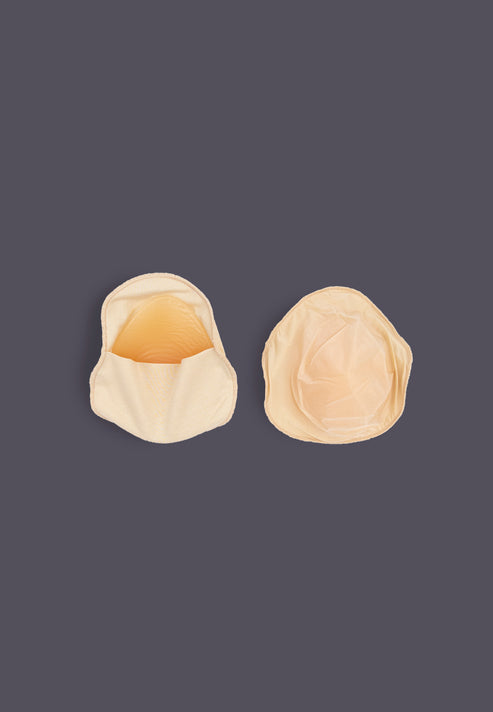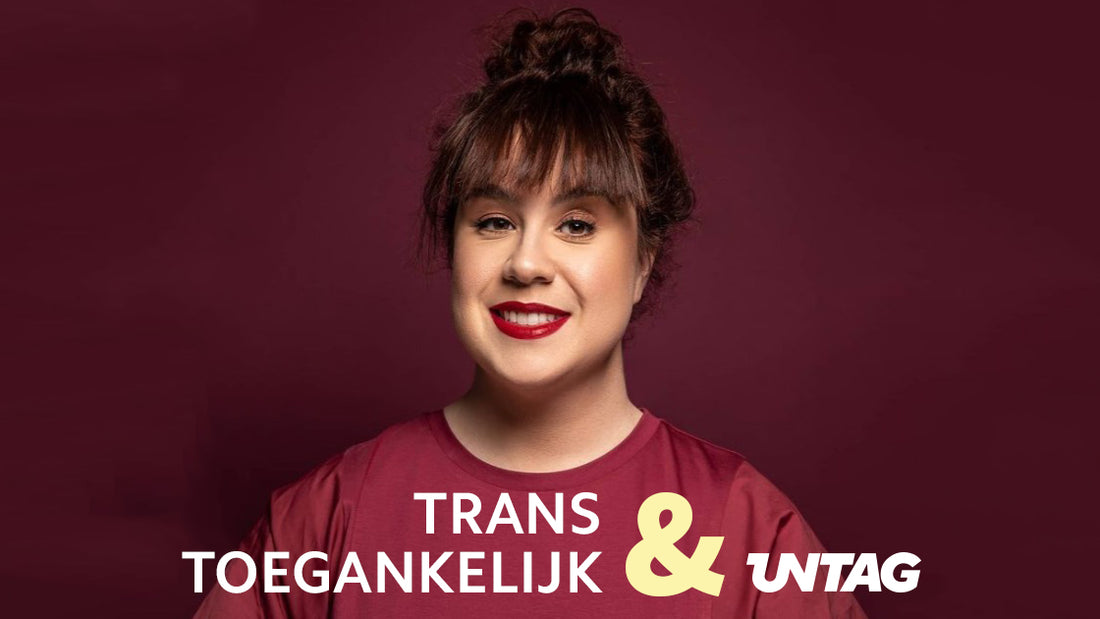In this interview UNTAG talks to Jessica Maes, an orthopedist who advocates for the interests of trans people with a mild intellectual impairment. Jessica is the founder of platform TransToegankelijk, which offers information and materials to care professionals who work with this target group. In this conversation we want to find out more about TransToegankelijk and the obstacles that trans people with an intellectual impairment can face.
Click here to visit TransToegankelijks website
Jessica, could you tell me what you do and what your background is?
Yes! My name is Jessica Maes, orthopedist and founder of the platform TransToegankelijk (TransToegankelijk translates to TransAccessisble, red.). I was born in Belgium and have been living in Zuid-Limburg for the past 15 years. I have been working in the care of people with intellectual disabilities for years. In 2018 I started getting interested in advocacy for trans people with an intellectual impairment. Over the past few years I’ve done multiple projects and developed multiple products when it comes to psycho-education. The more research I did the more I discovered the lack of information about this topic. At a certain point I realised I had gathered quite some useful information. Combined with the fact that I was often asked for more information about this topic, I decided to collect all my knowledge into one platform: TransToegankelijk.
How many people are involved with TransToegankelijk?
I am the initiator and thus the driving force. The number of people that are involved with TransToegankelijk varies per project. Sometimes there are four or five people involved, sometimes it’s me and one other person. But I am the common denominator in all projects.
Can you tell me a little bit about how care or trans care for people with a mental disability is different from people without these disabilities?
The care for trans people with a mild intellectual impairment (MII) is pretty much the same as care for trans people without impairments. The difference lies in the needs of this group. Transgender care really is care that’s tailored. We are still searching for the exact needs and support-questions of people with intellectual impairments in the transgender care. According to a study I conducted, it was found that transgender people with mild intellectual impairments are a lot more dependent on their support system and informal network. You’ll notice it in simple things like transport: how will you get to your care provider? Since they often can’t travel independently, this group is extra dependent on assistance. If you’re in the care of a healthcare professional that doesn’t see being trans as something positive, your journey in getting trans care can come to a standstill. So a big difference from someone who doesn’t have an intellectual impairment and who isn’t as dependent, is that they are able to take these steps themselves. My awareness of this dependency led me to set up my platform also aimed at healthcare professionals. With this platform I invite them to stand by their clients side and to look for suitable next steps together.
What are other things that this group deals with that differ from regular care?
What I found in my first research is that there is a need for accessible information. Consequently I started to focus more on this need. That’s where the name also came from: TransToegankelijk - this translates to TransAccessible. People with mild intellectual impairments can struggle with words like ‘binder’ or ‘mastectomy’. Overseeing the different steps in a gender transition can also be a challenge for this group. During a gender transition the question can arise whether a person can oversee a certain step. Accessible information can offer support in this case.
What is a common denominator that people with intellectual impairments are in need of?
The first thing that pops up in my head is that transgender people with mild intellectual impairments want to be seen as equal. I think that people with these impairments are in need of accessible information and support. They often struggle with finding the information they need. They also sometimes need help when it comes to making decisions.
What helps are the animation clips with product-explanations of UNTAG, which are also on our website. These clips clearly explain how to use certain gender affirming tools. These clips are especially useful for parents and caretakers of people with a mild intellectual impairment. They are usually the ones who help with wearing these tools. The clips are very short and clear: how do you put your binder on, or how does medical tape work? I think these clips have a significant value.
Do you think more awareness needs to be raised for the gender dysphoria of people with impairments?
Yes, I think there definitely needs to be more attention for gender dysphoria and people with mild intellectual impairments. This group tends to be forgotten or overlooked. It’s important that people are aware of the needs of this group. We all have our part in this. For example when an activity for transgender people is being organised. Ask yourself the following questions: is this event accessible to the whole transgender community? Can a disabled or impaired person also visit? And which steps can I take to make it accessible? There is a lot of progress to be made. It’s such a shame that this group is overlooked because they possess many talents. They are not ‘just’ people with a mild impairment, but powerful people that live a fulfilling life despite their support needs. I think people would be surprised to find out what a source of inspiration this group is.
Are there similar initiatives within the Netherlands? And what about Europe, or the rest of the world?
TransToegankelijk is active throughout all of the Netherlands. On our website you can find our ‘Social Map’: this map shows all healthcare professionals within the Netherlands who work independently or within an organisation for people with mild intellectual impairments within trans care.
An initiative that exists alongide TransToegankelijk is Transcafé LVB, where gatherings for these groups are held. At TransToegankelijk the focus lies on support for carers. At the Transcafé LVB the focus lies on the people themselves.
What about scientific research about transgender people with a mild intellectual impairment?
When it comes to scientific literature, this group also tends to be overlooked. There has been a recent study that implies the lack of research into this topic. It seems that this group of people is systematically overlooked, so it would be great if people became more aware of this. A few studies are currently underway, but significant progress has not been observed thus far.
What are your future plans for TransToegankelijk?
I hope that TransToegankelijk can remain a platform where people with a mild intellectual impairment can come for information and support. I want to raise more awareness for the needs of this group. So hereby I invite all of you to come take a look at TransToegankelijk’s website!
Background Information
About Jessica Maes
Jessica Maes was born in Belgium and has been living in Zuid-Limburg for the past 15 years. She studied orthopedagogy and has been a healthcare professional for people with mild intellectual impairments for years. In 2018 she started to become interested in advocacy for trans people with intellectual impairments. She noticed there was a big lack of knowledge and misunderstanding when it comes to this group, and that they struggle to gain access to the care and support they need.
About TransToegankelijk
Jessica launched the platform TransToegankelijk in 2023. The platform offers information and support that’s easily accessible, and has a social map where people can find the contact details of healthcare professionals who have experience with trans people with mild intellectual impairments.
Mild Intellectual Impairment
Individuals with a mild intellectual impairment face challenges as a consequence of limited intellectual capacity and limitations in their ability to adapt. These challenges manifest in facing difficulties when executing daily tasks that are needed for independence and responsible functioning in society. Think about tasks like reading and writing. Adaptive skills are divided into three domains in the DSM-5: conceptual, social, and practical. It’s worth noting that these limitations usually manifest before the age of 18.
In the Netherlands the term ‘Mild Mental Impairment’ is usually bestowed upon individuals with an IQ between 50 and 85. This concept also encapsulates people with impairments that struggle in their adaptive ability as a consequence of a lower intellectual capacity, or where a low IC has a negative influence on their treatment or prognosis.
Gender Dysphoria
People with gender dysphoria don’t feel at home with the gender they have been assigned at birth. They might identify as another gender, as no gender, or as something in between or fluid.
Transgender care
Transgender care is an umbrella term for medical, psychosocial and legal care that’s available for transgender people. This care can exist in the form of hormone therapy (HRT), surgical procedures and psychosocial support.
Informed consent
Informed consent is the capability to make your own, carefully considered decision. This means someone is able to understand information about a decision, can consider the possible consequences of this decision, and can make a decision in accordance with their own values and preferences.
People with mild intellectual impairments can struggle with understanding complex information when making decisions.
Useful sources:
Transtoegankelijk: https://www.transtoegankelijk.nl/
Transcafe LVB: https://transvisie.nl/onderling-contact/transcafe-lvb/
Informatie over ethiek: https://www.kennispleingehandicaptensector.nl/tips-tools/tools/wegwijzer-voor-meer-informatie-over-ethiek




